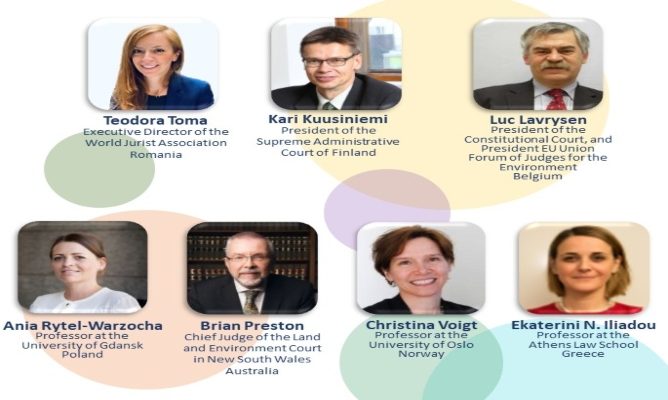On December 1, the World Jurist Association (WJA) and World Law Foundation (WLF) organized the Opening Session London of the World Law Congress New York 2023. Co-organized with Climate Policy Radar, Grantham Research Institute on Climate Change & the Environment of the London School of Economics, and Laws Africa, environmental law experts discussed about open source “Digital Resources for Climate Law”.
The online session addressed how digital technology can facilitate the effective use of legal data for climate law research, policy making and litigation. All of this, with a focus on protecting human rights and preserving the Rule of Law around the world.
In his introduction, Diego Solana, international advisor of the World Law Foundation, contextualized the current European energy crisis derived from the invasion of Ukraine, emphasizing its great impact on the economy and the Rule of Law. Likewise, he pointed out that this debate is a continuation of the Permanent Forum on Energy Transition and Climate, which will culminate in the World Law Congress New York 2023, to be held on July 20 and 21, 2023.
Open access to climate data and legislation is a guarantee of rights
The panel was chaired by Lord Robert Carnwath, former judge of the UK Supreme Court, member of Landmark Chambers and associate professor at the LSE Grantham Research Institute. Panelists included Michael Gerrard, director of the Sabin Center for Climate Change Law at Columbia University and leader of Climate Change Litigation Database, USA; Michal Nachmany, CEO and founder of Climate Policy Radar, UK; Greg Kempe, Chief Technical Officer and co-founder of Laws.Africa; and Catherine Higham, Coordinator of the Climate Change Laws of the World program at the LSE Grantham Research Institute.
After commenting on the relevance of access to climate legislation, case studies and jurisprudence for all nations, the former British judge gave the floor to Michael Gerrard, who presented two databases on climate change litigation that he and his team began working on in 2007. This exhaustive research also refers, with the United States as a sample for analysis, to the legal models for the pursuit of decarbonization and climate regulation around the world. “With these databases we have found the particularity that they can be used globally for climate litigation and their usefulness and functionality for society lies in the fact that they are freely accessible in all parts of the world.”
After a round of questions to Gerrard on the challenges and limitations in research, Carnwath passed the floor to Michal Nachmany, who explained that “sharing knowledge” was the “motivation” for starting Climate Policy Radar, a contribution to the academic community, but also to society. “We are building the world’s largest and most comprehensive open knowledge base on climate policy, law and litigation.” The database is structured, intuitive, available in multiple languages, and is also “open source and free”, which allows “discovering national climate legislation from any country of the world”.
Greg Kemple then stressed that, in Africa, there is no transparency or free access to the country’s own climate laws, which is a barrier to securing rights. This is a challenge that requires special attention, especially considering that the effects of climate change in African countries are greater than in other latitudes. Considering that the fundamentals for the use of legal information are impact, use, understanding, access, knowledge, and availability, Kemple ended his speech by stressing that “enabling free and effective access to the law is essential for government, administration, business, the fight against corruption, the environment, and human rights”.
After Carnwath’s review of the presentation, the floor was given to Catherine Higham who emphasized the need for lawyers to be updated and aware of the uses of artificial intelligence, technology and the different open access databases presented throughout the session. The coordinator of Climate Change Laws of the World focused on the global and individual importance of climate legislation and practical cases, pointing out as a problem that “not all countries in the world have access to legal data on climate policies and laws”. Therefore, it is necessary to understand “what is the impact of failing in a climate case against cooperation” and the importance of an international consensus agreeing the digitization and liberalization of information on climate litigation.
At the end, after a final presentation of ideas by the speakers and a debate on the subject, Diego Solana concluded the session by explaining the importance of experts in international and climate law. He also emphasized the importance of raising awareness and freeing access to databases on climate laws and enabling the development of the Rule of Law in different countries around the world, such as Africa. To conclude the Opening Session, Solana stated: “if it is not accessible, it does not exist“.
FULL VIDEO ON YOUTUBE: https://youtu.be/EvcEikQ4zEU
Follow us on twitter:


